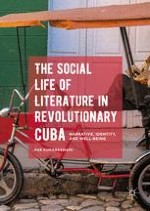2016 | OriginalPaper | Chapter
4. “La cultura es lo primero que hay que salvar”: Writers, Literature, and Well-Being in the Período Especial, 1990–2000
Author : Par Kumaraswami
Published in: The Social Life of Literature in Revolutionary Cuba
Publisher: Palgrave Macmillan US
Activate our intelligent search to find suitable subject content or patents.
Select sections of text to find matching patents with Artificial Intelligence. powered by
Select sections of text to find additional relevant content using AI-assisted search. powered by
